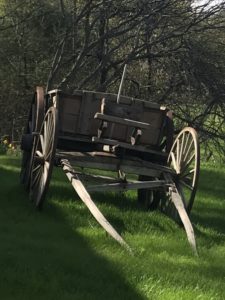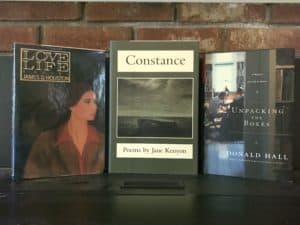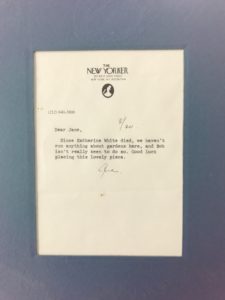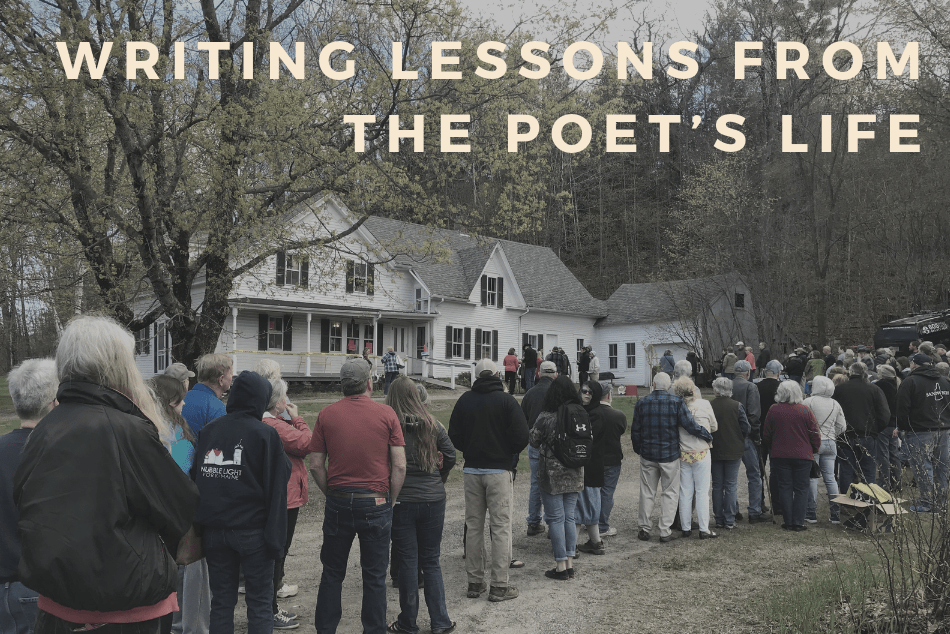Last year on June 23, 2018, U.S. Poet Laureate Donald Hall passed away at the age of 89 at his ancestral farm in New Hampshire, where he and his wife Jane Kenyon lived and wrote. Jane was a poet, too, and although she died at only 47 in 1995, she looms large in the private and public imagination of the poet’s life with Don at Eagle Pond Farm.
The 1860s farmhouse has been listed, and earlier this week an auction was held, in which the most valuable items were sold. Now, on a cold Saturday morning in May, they’re having an estate sale to get rid of the rest—including thousands and thousands of books.
Pilgrims and Poets
I’m there, standing in line with a couple hundred other people, a mix of locals, bargain hunters, and poetry lovers. Truth be told, I fall into all three categories. I chat with the other Don and Jane admirers waiting with me—a poet from Manchester, a scholar compiling Hall’s bibliography, a poetry fan and her husband, a writer who’s just finished his first mystery. We talk about writing and poetry and what we know about Don and Jane.
 We debate buying the old ox cart in front of the barn, which bears a great resemblance to the one in Hall’s award-winning children’s book, Ox-Cart Man, but someone else beats us to it.
We debate buying the old ox cart in front of the barn, which bears a great resemblance to the one in Hall’s award-winning children’s book, Ox-Cart Man, but someone else beats us to it.
They only let in thirty people into the house at a time. We wait two hours in the chill for our turn. Once inside, I walk from room to room, seeing the blue chair where Don liked to sit, the old chairs and wooden boxes and oil lamps he wrote about in his poems. I feel like I’ve just missed watching a baseball game with Don or sipping a cup of tea with Jane.
There are lessons here, in the things they left behind.
1) Writers embrace writers.
On top of a box of papers is a signed poster of “In the Time of Peony Blossoming,” by Robert Bly. Bly was Hall’s best friend, poets-in-arms, as it were. And Jane loved peonies, as revealed in her own poem “Peonies at Dusk.” I love peonies, too, as I love Jane and Don and Robert Bly. This is the first treasure I put aside to take home.
2) Writers keep on revising.
In an unsigned copy of Donald Hall’s Unpacking the Boxes, I find two Post-Its on the endpapers, notes that he’d written to himself. He’d also made lots of edits in one section of the book, as if he were marking up reprint corrections or carving out a section for an excerpt. An admonishment to revise and revise and revise, polish and polish and polish. Because the writers who publish are the writers who finish, and revise.
3) Writers need mentors.
There are books everywhere, stacked in bookcases and piled on beds and displayed on tables. I am overwhelmed at the thought of going through all these volumes; I’d like to but I’m on deadline and need to get back home to my own writing desk. And then I see it: Love Life, by James D. Houston. Jim Houston was one of my earliest mentors, the first “real” author to encourage me when I was a young and eager writer in Santa Cruz trying to write my first (awful) stories. He died in 2009, and I still miss him. For this novel—one of the few I do not have—to pop out at me among the thousands of books at Eagle Pond Farm is a sign. I buy the book, knowing it has something to teach me, as Jim always did.

4) Writers read.
Don and Jane had some 20,000 books. Don wrote literary criticism and Jane translated Russian poetry and Don loved baseball and Jane loved gardening and they both cherished the rural life. Those disparate interests are evident here, along with a love of the classics, the moderns, and the post-moderns, and everything in between. I feel far less guilty about telling my husband, when he asked why I was moving all my books to our new (bigger) house, that I now had 4000 square feet instead of only 1200 square feet, which meant I’d be adding books for the foreseeable future, not subtracting them. I buy three books here, Jim’s and Don’s and the one volume of Jane’s poetry I don’t have, Constance. I also buy two broadsides, one of Donald Hall’s “Mouth” and one of Jane Kenyon’s “Dutch Interiors.”
5) Writers write.
Upstairs in the attic office where Jane wrote, I find a framed rejection letter from The New Yorker, advising Jane in clipped language that “since Katherine White died, we haven’t run anything about gardens here….” Donald Hall and Jane Kenyon wrote all their lives. They wrote through good times and bad times, through all of the ups and downs of their respective careers, through rejection and depression and illness and grief and death. I show the framed letter to the poet I met outside in line, and she says, “Hold on to that.” And I will.

The Price of Poetry
In total, I spend $117. I go home feeling wildly blessed, even knowing that I will spend three times more than that to frame the Robert Bly poster and the broadsides.
I look up the interview with Donald Hall in the Paris Review, where he served as the poetry editor for many years. I read it, delighted that the last line is, “I was a horse’s ass.” I place Jane’s rejection letter on my desk, a talisman to remind me that the work is the thing. I make a note in my gardener’s journal to plant peonies.
And I start to read Unpacking the Boxes: A Memoir of a Life in Poetry.
For more, join our discussion on Facebook.





